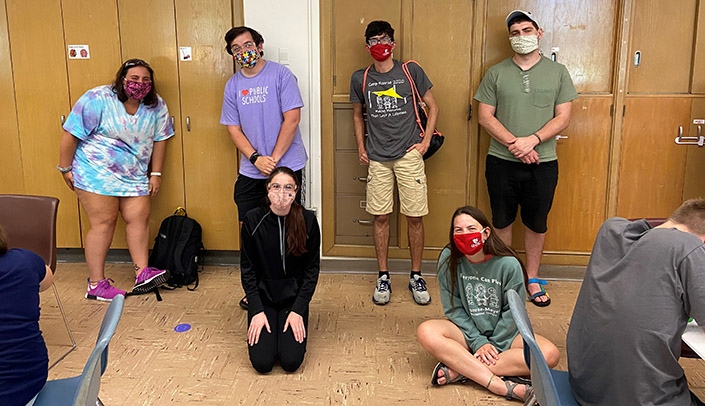Number of weeks of Camp Munroe in 2020: Four.
Average number of campers per week: 27.
Cases of COVID-19: None.
MMI families called this year’s four-week session of Camp Munroe “a much-needed break,” “a wonderful time” and “awesome.”
“It was obvious,” one parent wrote in a post-camp review, “that the staff had completely thought through keeping the campers engaged, happy and healthy.”
Another said: “Camp Munroe was the only activity I have felt safe enough to send my child to since March 2020.”
Nicole Giron, director of the Munroe-Meyer Institute Department of Recreational Therapy, said she’s proud of the recreational therapy team — proud that in perhaps the most challenging year in the camp’s 38-year history, during the nationwide COVID-19 pandemic, MMI was able to provide a safe, fun event for MMI families in great need of one.
“It was thanks to the leadership of Dr. Karoly Mirnics, the safety precautions set in place at UNMC and MMI, and especially thanks to the support of our Hattie B. Munroe board,” she said. “We were grateful that they stood behind us so we could hold the camp.”
Sanitation and infection control are important every year at camp, Giron said.
“We regularly employ strict sanitation methods because many of the kiddos we see are immunocompromised. That’s a normal part of our routine.
“This year, though, we were extra vigilant” she said.
The daily routine:
- Staff met parents and families at the building entrance, and the children had their temperature taken. Family members did not come inside the building.
- The staff instituted contact tracing, so Giron was aware of which campers and staff members had interacted.
- Campers were put into “pods” of two staff members and two campers. Those four people stayed in the same group for the entire week.
“We made sure campers stayed six feet apart — just because they were in a pod didn’t mean they were next to each other,” Giron said. “The therapist and staff of course were working more closely with the kids.
“We knew the importance of the three main preventive measures: wearing masks, handwashing and social/physical distancing,” she said. “We measured our rooms and knew the square footage. A study had indicated 40 square feet per person was necessary to effectively social distance, so we knew our rooms at capacity could hold about 17 people. Still, we were conservative — we had only six campers and six staff per room.”
The staff-camper ratio was one-to-one, in part to ensure campers maintained distancing from one another. “That was really critical,” Giron said.
“In addition to the square footage and staff oversight/buddy system, we used visual cues for the campers in the form of large vinyl colored happy face stickers,” Giron said. “The kids themselves were simply amazing and were active helpers in doing their part to contribute to the safety of summer camp. Though it was an enormous undertaking to measure out the spaces, having visual cues everywhere at camp was essential to help the campers maintain social distancing.”
At the beginning and end of each 45-minute activity period, everyone washed their hands, and everything that had been touched — art supplies, cooking supplies, basketballs, even tables and chairs — were sanitized.
“It was easy to do, because of the smaller number of campers,” Giron said. “Instead of having 10 basketballs out, we could have four basketballs out, which really helped with the cleaning and infection control.
“It seemed like camp as usual, except we all had masks on. It was especially fun to see the campers arrive each morning very proud of their mask and the fun designs they could show off.”
In addition, Giron emphasized the MMI staff’s vigilance about adhering to safety measures when away from MMI. “Our staff was very careful when in the community outside of work hours in order to do their best to protect the campers,” she said.
Giron called holding the camp imperative, as soon as she was certain it could be done safely.
“For these kids to be home, isolated for more than five months, is an untenable situation,” she said. “Camp is where their friends are. Camp is so vital to everyone’s summer. Not only are we providing adaptive life skills and socialization, but it’s that much-needed respite for families – especially when they’ve been locked in their houses for months on end.
“All of us were a bit nervous, but we knew we had to do something, and with the mission of MMI to support our families, it was especially critical in these difficult times. We did the best we could to provide the safest, lowest-risk environment, and we are grateful for the families for sharing their campers with us for a summer that will always be remembered.”
